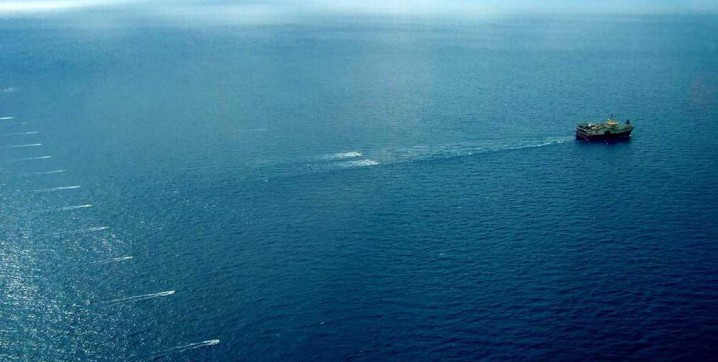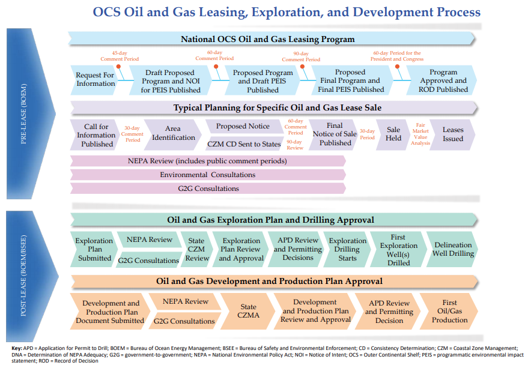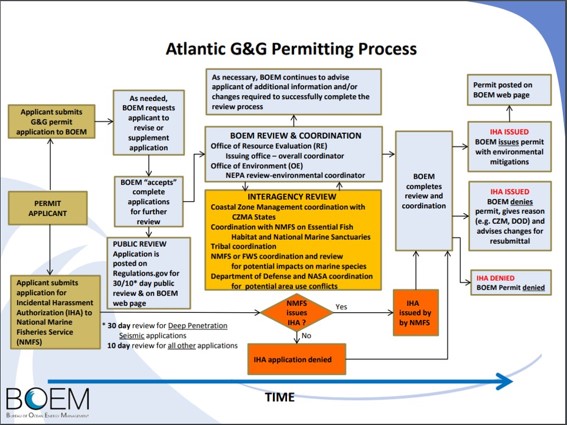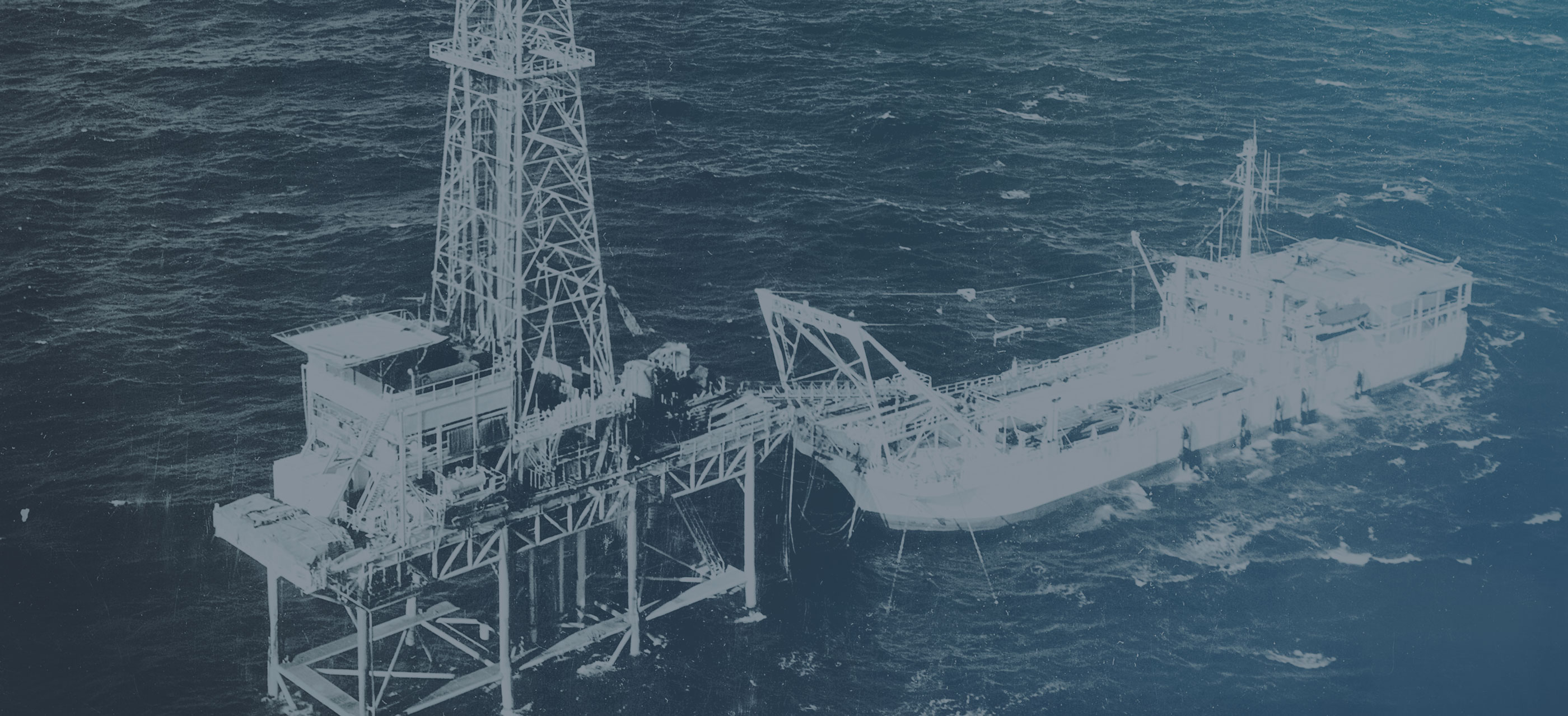The North Carolina Coastal Federation opposes offshore oil drilling because of the severe risks it poses to our coastal ecosystems, wildlife, and economy.
Offshore drilling involves extracting oil and gas from beneath the seafloor, often through large platforms, extensive pipelines, and support vessels operating continuously in sensitive marine environments. These activities can lead to oil spills, routine discharges of toxic chemicals, and chronic habitat disruption. Drilling threatens marine mammals, sea turtles, fish, and the habitats they rely on, while also impacting the tourism and fishing industries that support North Carolina’s coastal communities.
The potential economic and environmental consequences of offshore oil development are too great to risk. North Carolina’s waters, beaches, and barrier islands should remain protected from offshore oil and gas exploration and development.
The North Carolina Coastal Federation opposes seismic surveys because of its negative effects on fish and marine mammals as well as the potential barriers the activity poses to access for recreational and commercial fisheries.
Seismic surveys are the first step in planning where offshore oil and gas exploration will occur. The ship pictured above is towing an airgun array used to produce seismic waves that propagate to the seafloor to locate oil and gas resources. If permitted, seismic surveys continuously generate airgun blasts throughout the survey area for months at a time. These surveys are known to disrupt behavior patterns for marine mammals, sea turtles, fish, and can decimate zooplankton populations, the base of the marine food web. Additionally, the destructive processes associated with offshore drilling pose too great a risk to this state’s coastal economy and environment. The waters off North Carolina should be off-limits to offshore oil and gas exploration and development.

The Latest
11th National Outer Continental Shelf Oil and Gas Leasing Program
June 16, 2025 – The Bureau of Ocean Energy Management (BOEM) is developing a new five-year leasing program and is
now accepting public comments. Drilling could bring devastating oil spills, harmful seismic blasting, and
long-term damage to endangered species and coastal communities — all for minimal energy gain. North
Carolina’s coast is irreplaceable and overwhelmingly opposed to drilling. Read the comment letter submitted on behalf of the Federation.
Read more about the push to stop offshore oil and gas exploration in these news articles.
- NC and SC governors unite against Trump administration’s offshore drilling plan– The News & Observer
- On the Outer Banks, opposition mounts to offshore energy exploration – The Outer Banks Voice
COAST Anti-Drilling Act: Support Needed
May 26, 2021 – The Clean Ocean And Safe Tourism (COAST) Anti-Drilling Act was introduced in the House (H.R. 3116) and Senate (S.1851). The bill would amend the Outer Continental Shelf Lands Act to permanently prohibit the exploration, development, and production of oil or natural gas from occurring on the Outer Continental Shelf in the North Atlantic, Mid-Atlantic, South Atlantic, and Straits of Florida planning areas. Contact your Congressional members of the Senate and House of Representatives and ask them to support the COAST Anti-Drilling Act to permanently protect our coast from the negative impacts of offshore drilling.
History of the Issue
January 27, 2021 – Secretary of Interior to Pause New Oil and Gas Leases on Public Lands
On Jan. 27, President Biden signed an Executive Order that directs the Secretary of the Interior to pause new oil and natural gas leases on public lands and offshore waters to the extent possible. This action represents a significant step towards the permanent protection of our coast from the impacts of offshore oil and gas exploration and drilling. The accompanying Fact Sheet summarizes the details included in the EO, which focuses on actions that can be taken to address climate change. Additionally, the EO directs the Secretary to launch a rigorous review of all existing leasing and permitting practices related to fossil fuel development on public lands and waters, and identify steps that can be taken to double renewable energy production from offshore wind by 2030. Currently, Kitty Hawk Offshore is the only wind energy area in development off the coast of North Carolina.
October 2, 2020 – Offshore Drilling Moratorium Expanded to NC
President Trump signed a Presidential Memorandum on Sep. 25 that expanded an offshore drilling moratorium to the waters off the coast of North Carolina. The memorandum to the Department of Interior states, “this withdrawal prevents consideration of this area for any leasing for the purposes of exploration, development, or production during the 10-year period beginning on July 1, 2022 and ending on June 30, 2032.” Unfortunately, the memorandum only references the portion of the planning area that lies south of the northern administrative boundary line of North Carolina, and not the entire Mid-Atlantic Planning Area or the entire Atlantic Coast. Therefore, continued grassroots efforts to contact local, state, and federal representatives with the request to expand the moratorium for the entire Atlantic Coast are encouraged as the acute and chronic impacts of offshore drilling do not respect state lines. The federation will also continue to monitor the status of these moratoriums as President Trump stated that he, “can change things very easily,” immediately after announcing the decision to add North Carolina to the moratorium during a campaign rally.
September 22, 2020 – Offshore Drilling Moratorium Requested for NC
Senator Tillis issued a news release on Monday, September 21 announcing that “North Carolina will be included in a Presidential Memorandum withdrawing new leasing for offshore oil and gas developments for the next 12 years. Under the order leases for the purposes of offshore development are prohibited between July 1, 2022, and June 30, 2032.” This followed an earlier request Governor Cooper sent in a letter Sept. 15 that urged President Trump and his administration to include North Carolina in the recently announced moratorium. Governor Cooper released a statement on Sep. 22 that he will “stay vigilant and ready to resume the fight in the event the federal government makes any move toward offshore drilling,” while waiting for confirmation that the President will extend the offshore drilling moratorium to North Carolina’s waters.
March 11, 2020 – 100% of oceanfront municipalities oppose offshore drilling and seismic testing
100% of oceanfront municipalities in North Carolina have now passed resolutions opposing offshore oil drilling and seismic testing. The Town of Indian Beach in Carteret County adopted such a resolution during the March meeting of the Board of Commissioners, joining a total of 44 other towns, cities, and counties throughout the state. Even inland communities, some located as far west as Asheville, have joined in this fight that affects all North Carolinians.
2015-2018
2018
- Environmental groups sue to stop seismic surveys in Atlantic Ocean
- National Marine Fisheries Service (NMFS) granted incidental harassment authorizations to five companies that submitted applications to conduct seismic surveys
- Bureau of Ocean Energy Management (BOEM) releases the Draft Proposed 2019-2024 National Outer Continental Shelf Oil and Gas Leasing Program and proposed leases in nearly all U.S. waters
2017
- BOEM releases public notice for comment on new five-year leasing program
- NMFS releases public notice for comment on seismic surveys after companies successfully challenged the denials of six pending permits
- BOEM formally denies six pending permits for conducting seismic surveys off the Atlantic coast
2016
- BOEM releases Final Environmental Impact Statement and removed Mid- and South Atlantic Planning Areas from 2017-2022 Program
2015
- BOEM releases Draft Proposed 2017-2022 National Outer Continental Shelf Oil and Gas Leasing Program and proposed leases in Mid- and South Atlantic Planning Areas


Resources
- Offshore Drilling is Wrong for North Carolina: A Thriving Yet Fragile Coastal Economy
- MACE SC Offshore Drilling Letter to Secretary Burgum
- NRDC Ecological and Economic Impacts BP Deepwater Horizon
- Oceana Dirty Drilling Report
- Oceana Dirty Drilling Infographic
- Oceana NC Offshore Energy
- Offshore Drilling Onshore Damage Report
- Offshore Drilling Onshore Damage Factsheet
- SODA Claims vs Facts
- SODA Debunking False Claims
- SODA Drums of Death
- SODA Tourism vs Oil
- SODA Truth about spills
- Surfrider Fact Sheet
Read More
- The Federation’s comment letter to BOEM on the proposed 2019-2024 Outer Continental Shelf Oil and Gas Leasing Program (2018)
- The Federation’s comment letter to BOEM in response to a request for comments for a 2019-2024 leasing program (2017)
- The Federation’s comment letter to BOEM on the danger seismic surveys pose to fish (2016)
- The Federation’s comment letter to the National Marine Fisheries Service requesting that it meets with BOEM to discuss the potential risks fish face because of seismic surveys (2016)
Questions? Contact Coastal Advocate Kerri Allen at kerria@nccoast.org or 252-393-8185. More information is also available at dontdrillnc.org.
The Power of Policy
You can help protect one of the healthiest and most beautiful ecosystems in the world through advocacy and policy.

